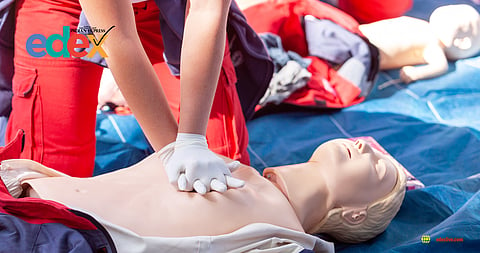

Nearly 50 per cent of people in high-income countries have undergone CPR training. But in India, the bystander Cardio-Pulmonary Resuscitation (CPR) rate remains alarmingly low, ranging only between 1.3% and 9.8%.
To create widespread awareness and build capacity among the general public about CPR, the National Medical Commission (NMC) has asked all medical colleges and institutions to participate in this awareness campaign.
The CPR Awareness Week, from October 13-17, is being organised in the country by the Union Health Ministry.
In a public notice, the NMC stated that the initiative aims to enhance the awareness, preparedness, and capacities of the general public across all sectors in performing CPR.
The notice, dated October 10, said, “A sudden cardiac arrest continues to be a major cause of preventable mortality, and timely administration of Cardio-Pulmonary Resuscitation (CPR) by trained individuals significantly improves chances of survival. Creating widespread awareness and building capacity among the general public is, therefore, a public health priority.”
Noting that CPR is a lifesaving technique that plays a critical role in reviving individuals during sudden cardiac arrest, the NMC said that studies indicate that without CPR, brain damage can occur within minutes. Every minute of delay decreases survival by 10%, the NMC said.
“Immediate bystander CPR can increase survival by two to three times. While nearly 50% of people in high-income countries have undergone CPR training, in India, the bystander CPR rate remains alarmingly low, ranging only between 1.3% and 9.8%.”
The nationwide CPR Awareness Week will feature a series of activities designed to promote awareness, training, and community engagement.
The key activities will include a nationwide pledge on CPR. This is for all health facilities across the country, from primary to tertiary levels, in virtual mode as well as through other modes.
Also, to hold a pan-India panel discussion on 'CPR techniques and role of bystanders.'
The medical colleges were also asked to build capacity by healthcare professionals and students from medical institutes, which involved organising physical demonstrations on compression-only CPR.
The notice, by Rajiv Sharma, Director (Policy and Coordination), stated that medical colleges also need to create awareness-building initiatives by participating in poster-making competitions or holding quiz competitions themed around the need and role of bystander CPR, among other initiatives.
The NMC also shared dos and don’ts for them.
Among the dos, NMC listed that it should be ensured that the victim is lying on a firm, flat surface; to keep elbows straight while performing chest compressions; performing chest compressions at a rate of 100-120 per minute; allowing chest to return to normal position before giving the subsequent compression; continuing CPR till either the person is revived or medical help arrives and to use an Automated External Defibrillator (AED), if and when available.
Among the don'ts, the NMC listed not to panic, not to delay chest compressions, not to administer chest compressions if the victim is conscious, not to interrupt between chest compressions, and not to bend elbows while giving chest compressions.
The NMC has requested that medical colleges share their action taken reports with the health ministry.
